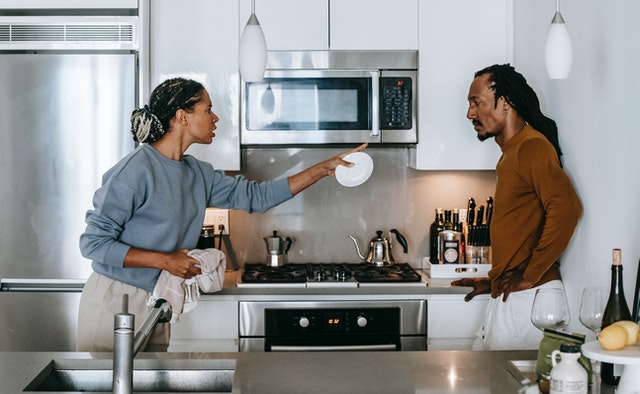Things to Do If You Feel That You and Your Partner Are Always Playing the Blame Games
When you are in a relationship, it is quite easy to shift all the blame on your partner even if you know it is not completely their fault. After all, nobody ever truly wants to be wrong. But when you are in a relationship, it is essential to sacrifice being correct for the good of the relationship. If you don’t, marriage counselor Shivani Misri Sadhoo says the blame game can damage your relationship.
Blaming, specifically the constant blaming is a quite unhealthy communication style and mostly leads to one fighting unfairly and bringing in the past into the present arguments.
Playing the blame game is quite common. But that does not make it healthy. In fact, relationship expert Shivani says blaming is never a positive thing and is generally a sign of an unhealthy relationship dynamic. This can vary from everyday things to major things. More often than not, it is not about the ‘what’ you are blamed for, but rather the ‘why’ you are being blamed or needing to blame. For example, if one partner has a difficult time owning up to their mistakes, he/she will push the accountability on someone else.
Nothing positive can ever really come out of blaming your other half. So in this blog, India’s top Marriage Counselor and Relationship Expert Shivani Misri Sadhoo say what you can do to stop the blame game from sabotaging your relationship.
Identify When You Are Being Blamed And Discuss It
If one of you feels like you are being blamed for something, bring this up. Reach to the root of why your spouse is making you feel like you have done something wrong. Make it known and grab it as soon as possible. When left unattended, it can start to become a pattern in the relationship that is seen as normal. Patterns of blaming could lead to unhealthy and potentially toxic relationship styles. To prevent getting stuck in a blame game cycle, never call your partner out on it. Use “I” statements rather, such as “I feel like you are blaming me for something and I need to understand why.
Always Remind Yourself That Your Partner Is Not You
Sometimes all it takes is a small shift in mindset. Accepting that your partner is distinct from you can be an essential reframing. So always remind yourself, your partner is different, not necessarily wrong. Then, have a calm discussion in an attempt to understand where your partner is coming from. If you don’t, it’s normal to end the discussion by agreeing to disagree.
Talk Honestly About Your Expectations
When couples find themselves engulfed in the blame game, it is mostly because they and/or their spouse have implicit expectations about specific things that must be happening in the relationship or the manner that their partner must or must not be behaving. It is essential to remember that your partner is not a mind reader. They may assume to know what you need, but they won’t ever really know unless you openly let them know. Recognizing what these expectations are, and voicing them to your partner is crucial in breaking this pattern. A conversation about the expectations can help to put the blame game on the backtrack.
Active Listening
Be open, curious, and truly listen to your partner. As difficult as it might be, do not say anything while your partner shares their side of the story. If you provide them an opportunity to speak and actually listen to what they are saying, you can avoid a big argument.
Practice Gratitude
The antidote to criticism and blaming is to opt to focus on enjoying each other more. When everything’s annoying, that is a litmus test that is telling you are not focusing enough on positive input. So, practice gratitude. Think about all the various things you love about your partner every day and express your appreciation. When you continuously see your partner in a good light, you are less possibly to blame, criticize, or lash out in hurtful ways.
Know That You Cannot Control How Your Partner Reacts, But You Can Control Yourself
The simplest way to get stuck playing the blame game is to keep throwing accusations to and fro. While you cannot control what your partner says or does, but you can control yourself. It’s essential to remember that you are still individuals, two individuals who together make up one couple. You still have the right to speak up, shift away from a situation that you do not like, or simply leave altogether.
Your Counselor Is Now Just Skype/Video Call Away
During the current challenging time, it’s common to experience anxiety, depression, sleeplessness, and relationship challenges at home. While you are under lockdown and maintaining social distancing norms to help the country to control COVID-19 spread, your very own counsellor Shivani is now just a call and Skype video call away from you.
However, in this age of coronavirus, we hope to offer our therapeutic help. Change is difficult for all of us and changing the way you meet with your therapist is no exception. But try it before you disregard this option. This is a challenging moment in time, and fears and anxieties are running high.
You may find, telepsychology isn’t a second-rate option. Instead, it’s an effective and efficient upgrade to a valuable service!
Feel free to call Counselor Shivani Misri Sadhoo at +91-8860875040 for telephonic or video support and to book an online counselling session to address any relationship issues, emotional and psychological challenges.
- Does Living with In-Laws Affect Your Marriage? 5 Ways to Deal - July 23, 2024
- Is Your Job Destroying Your Marriage? 7 Signs to Look for - July 15, 2024
- Do you Know How to Handle a Manipulator Effectively? - July 11, 2024
